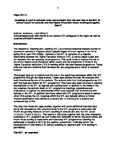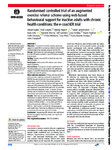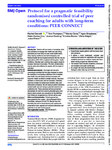Employee flourishing: The application and efficacy of workplace coaching as a methodology for improving mental well-being
| dc.contributor.supervisor | Tripathi, Smita | |
| dc.contributor.author | Sydenham, Alison Leigh | |
| dc.contributor.other | Plymouth Business School | en_US |
| dc.date.accessioned | 2020-10-29T14:51:18Z | |
| dc.date.available | 2020-10-29T14:51:18Z | |
| dc.date.issued | 2020 | |
| dc.identifier | 317517 | en_US |
| dc.identifier.uri | http://hdl.handle.net/10026.1/16610 | |
| dc.description.abstract |
The literature concerning the well-being of the working age population demonstrates that being in good work supports health and mental well-being. However, there is a lack of preventative measures to facilitate this in spite of growing research into the measures and determinants of well-being. This thesis highlights the growing literature on the benefits of coaching and sought to determine the efficacy of workplace coaching as a methodology for improving mental well-being through addressing three key areas identified as gaps within the literature: Does participants’ well-being change as a result of a workplace coaching intervention; What changes to mental well-being occur as a result of workplace coaching; What are the contributing processes and causal mechanisms of workplace coaching? A critical realist, mixed methods research design was adopted which involved three phases of participants (n=47) who undertook either a coaching/training programme; workplace coaching; or no intervention (control). Analysis of the results demonstrated a significant improvement in the well-being of participants compared to the control group across a number of well-being outcomes, particularly that coaching had a direct positive influence on personal, physical and emotional well-being; resilience and self-efficacy, autonomy and engagement, and it is further suggested that there is a positive relationship between well-being and those working/ volunteering as a coach. The critical realist methodology enabled a retroductive approach to data analysis and identified the causal mechanisms of coaching. This explained that supportive challenge; listening skills; professional conversation; space; time and location of the coaching were all important factors that contributed towards well-being outcomes. The process of coaching was also identified along with the mediators of coaching (wellbeing recognition; perspective; goal clarity; resilience and self-efficacy; and motivation). Together these findings offer an explanation of the efficacy of coaching for mental well-being outcomes. Overall, the findings of this thesis make an original contribution to theory, literature and professional practice, in particular that there is a positive link between workplace coaching and mental well-being and that there are specific underlying causal mechanisms which impact on these outcomes. Two coaching models are proposed that can guide evidence-based coaching practice; these identify a coaching process that contributes to well-being outcomes, along with highlighting the underlying causal mechanisms and specified well-being outcomes that may be achieved through coaching. | en_US |
| dc.language.iso | en | |
| dc.publisher | University of Plymouth | |
| dc.subject | Mental Well-being | en_US |
| dc.subject | Happiness | en_US |
| dc.subject | Flourishing | en_US |
| dc.subject | Coaching outcomes | en_US |
| dc.subject | Coaching mediators | en_US |
| dc.subject | Coaching efficacy | en_US |
| dc.subject | Coaching, in the Workplace | en_US |
| dc.subject.classification | PhD | en_US |
| dc.title | Employee flourishing: The application and efficacy of workplace coaching as a methodology for improving mental well-being | en_US |
| dc.type | Thesis | |
| plymouth.version | publishable | en_US |
| dc.identifier.doi | http://dx.doi.org/10.24382/575 | |
| dc.identifier.doi | http://dx.doi.org/10.24382/575 | |
| dc.rights.embargoperiod | No embargo | en_US |
| dc.type.qualification | Doctorate | en_US |
| rioxxterms.version | NA | |
| plymouth.orcid.id | https://orcid.org/0000-0001-8343-9585 | en_US |
Files in this item
This item appears in the following Collection(s)
-
01 Research Theses Main Collection
Research Theses Main





